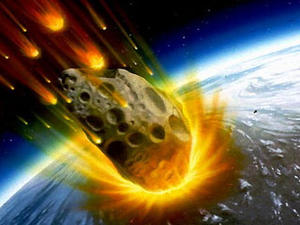Planetary securityBest way to stop a killer asteroid? Form a committee
The United Nations (UN) has adopted several recommendations of a new asteroid defense plan, the first steps in preventing Earth from being struck by an asteroid. The recommendations were a response to an asteroid strike earlier this year in Chelyabinsk, Russia. This object injured thousands and was around seventeen meters across. We have only found 1 percent of these “killer” asteroids, meaning there are hundreds of times more out there than we know of. One of them, sooner or later, will have our name written on it. For a global threat we need a global response, as well as a global share of the blame if it goes wrong.

The problem is that we might sight them early enough to prevent substantial damage and loss of lufe // Source: sundaymercury.net
The United Nations (UN) has adopted several recommendations of a new asteroid defense plan, the first steps in preventing Earth from being struck by an asteroid.
The recommendations were a response to an asteroid strike earlier this year in Chelyabinsk, Russia. This object injured thousands and was around seventeen meters across. Something ten times bigger exploded over a remote Siberian region called Tanguska in 1908. This flattened thousands of square kilometers of forest like matchsticks, with a force hundreds of times that of the Hiroshima atomic bomb.
We have only found 1 percent of these “killer” asteroids, meaning there are hundreds of times more out there than we know of. One of them, sooner or later, will have our name written on it.
A little disappointingly for fans of Bruce Willis’s Armageddon, the UN’s first steps included setting up committees. These will share information about any incoming asteroids (the International Asteroid Warning Group) and decide who will coordinate Earth’s response (the Committee on the Peaceful Uses of Outer Space).
It may not sound like much, but this is in fact a big deal. One of the longstanding issues in dealing with an incoming asteroid was the legal implications of what happens if it goes wrong.
Simply put, if NASA realized the asteroid would hit the United States, and managed to only change the asteroid’s direction to avoid the States but hit China, this could be seen as an act of war (or the mother of all lawsuits at the very least).
For a global threat we need a global response, as well as a global share of the blame if it goes wrong.
The hard bit is over?
Now it’s clear(-er) who is to deal with any incoming asteroids. That leaves the “simple” matter of finding the asteroids and deflecting them.
Asteroids are small, about the size of a football field (of any footy code), which is tiny by astronomy standards. This isn’t a search for a needle in a haystack. It’s a search for that needle somewhere in all the hay on Earth.
